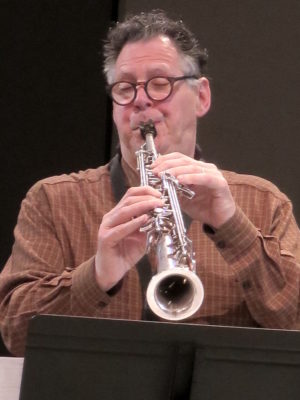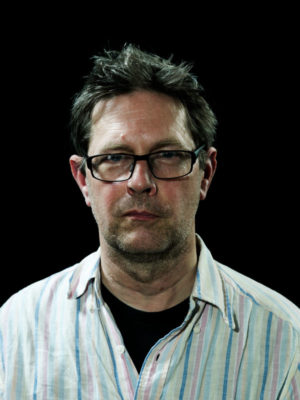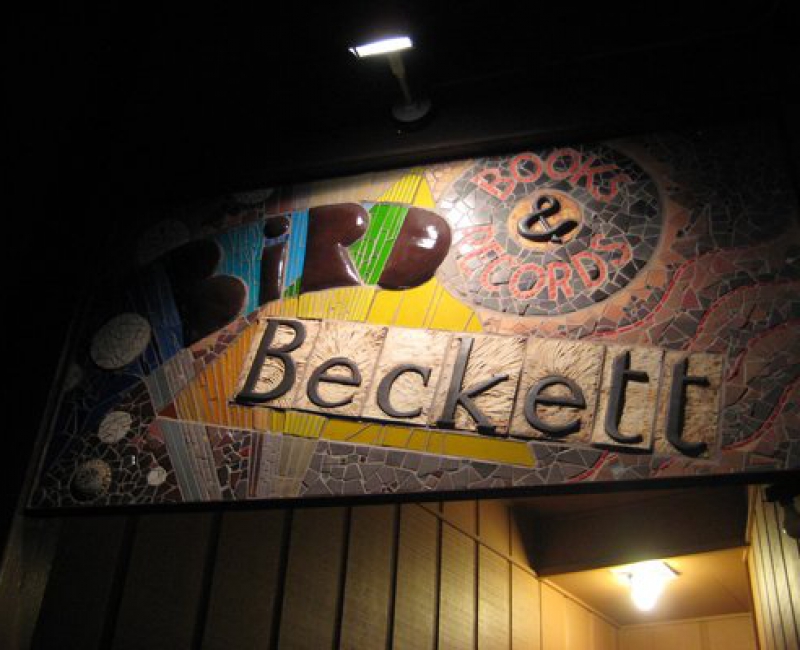653 Chenery Street
in San Francisco's Glen Park neighborhood
1-415-586-3733
[email protected]
Open to walk-in trade and browsing
Tuesday to Sunday
noon to six
Live Streams every weekend!
Refresh your browser to catch a show in progress!
Visit our Facebook page or YouTube channel!
But nothing beats being in the room with the music & the musicians!
We sincerely regret to announce that the Bruce Ackley / Phillip Johnson date, previously scheduled for June 11th, has been postponed. We look forward to rescheduling when possible.
 Bruce Ackley has been a cornerstone of the world-traveled, San Francisco-based saxophone quartet Rova since its founding in 1978. Born in Rochester, New York in 1948, he began singing in choral groups at age 10, taking up the saxophone in 1970. He formed his first improvising trio that year with friends from his art school days at Wayne State in Detroit, where he studied painting and drawing. In 1971 he relocated to the Bay Area.
Bruce Ackley has been a cornerstone of the world-traveled, San Francisco-based saxophone quartet Rova since its founding in 1978. Born in Rochester, New York in 1948, he began singing in choral groups at age 10, taking up the saxophone in 1970. He formed his first improvising trio that year with friends from his art school days at Wayne State in Detroit, where he studied painting and drawing. In 1971 he relocated to the Bay Area.
Largely self-taught, Bruce studied saxophone briefly with Lee Hester and Noel Jewkes, and clarinet with Beth Custer and Ben Goldberg. Throughout the 1970s he was involved with the emerging free improvisation scene in San Francisco, and formed Sound Clinic with Lewis Jordan and George Sams in 1975. He began playing with Larry Ochs in 1973 and Jon Raskin in 1975, which led to the formation of Rova in the fall of 1977.
Since that time Ackley has mainly devoted his musical life to his work with Rova, with some notable side projects. In 1977 he performed and recorded with the quartet Twins, featuring John Zorn on reeds, and Eugene Chadbourne and Henry Kaiser on guitars. During the 1980s he played regularly with trombone-electronics wizard, J.A. Deane and drummer Joseph Sabella. They formed Planet X in 1992, which performed extensively in the Bay Area and made a recording at that time. Bruce has also performed with the Italian bass virtuoso, Stefano Scodanibbio. In 1996 they performed together with koto-electronics player Miya Masaoko, and the brilliant cellist, Rohan de Seram, formerly of the Arditti String Quartet.
That year Ackley formed a trio to perform his more jazz-oriented original compositions, Actual Size, with George Cremaschi on bass and Garth Powell on drums. This led to the recording The Hearing by the Bruce Ackley Trio, featuring Joey Baron on Drums and Greg Cohen on bass, and released on the John Zorn-curated Japanese label Avant. During the late 1990s Bruce formed Frankenstein, a jazz repertory band that played the music of many of the forward-looking artists of the early ‘60s, particularly Grachan Moncur III, Andrew Hill, Eric Dolphy, and Jackie McLean—providing him an opportunity to dig into material that significantly impacted Ackley during formative years.
Although he occasionally steps out to work with Bay Area improvisers, Ackley is currently working almost exclusively with Rova, and he is focusing more on writing material for the quartet and thinking about next steps with other musicians.
 Phillip Johnston was born in 1955 in Chicago, Illinois and raised in New York. During the 1970s in New York City, Johnston met and began playing with a number of associates, many of whom, including John Zorn, Joel Forrester, Eugene Chadbourne, Bill Horvitz, Wayne Horvitz, Dave Hofstra, Richard Dworkin, Shelley Hirsch, Bruce Ackley, Jon Raskin, and many others. would become lifelong collaborators.
Phillip Johnston was born in 1955 in Chicago, Illinois and raised in New York. During the 1970s in New York City, Johnston met and began playing with a number of associates, many of whom, including John Zorn, Joel Forrester, Eugene Chadbourne, Bill Horvitz, Wayne Horvitz, Dave Hofstra, Richard Dworkin, Shelley Hirsch, Bruce Ackley, Jon Raskin, and many others. would become lifelong collaborators.
During the 1970s, Johnston yo-yo’d back and forth between San Francisco and New York, eventually settling in New York in late 1979. In the early 1980s he was performing with Joel Forrester ensembles of various sizes (from duo through septet), then with his own groups The Public Servants and The Microscopic Septet, and participating in countless musical projects and various ‘Downtown’ music scenes, including those around Studio Henry. It was during this time that he also began writing music for film, theater, dance, beginning with Lynne Tillman and Sheila McLaughlin’s film, Committed, in 1984.
During the 1980s and 90s, he toured widely with The Microscopic Septet in Europe, Canada and the United States, and continued to write music for films including Doris Dörrie’s Geld (1989), Philip Haas’s The Music of Chance (1993), Henry Corra’s Umbrellas (1994) and Paul Mazursky’s Faithful (1996). In 1993 he created his first original score for silent film, for Tod Browning’s The Unknown (1926) which was premiered at the American Museum of the Moving Image. Beginning in the early 90s he led new groups, including Big Trouble and the Transparent Quartet.
In 2005, he moved to Sydney, Australia with his wife, Australian playwright Hilary Bell, and their two children. In Australia, he wrote music for theater (Bell Shakespeare Company, Darlinghurst Theatre Company, NORPA), film (Stolen Life, Mr. Sin: The Abe Saffron Story, Shock Room), and formed a number of bands, including the Greasy Chicken Orchestra, performing Johnston’s arrangements of jazz of the 1920s/1930s, focusing particularly on the music of Jelly Roll Morton; SNAP, a saxophone quartet, co-led with Sandy Evans; Tight Corners: Jex Saarelaht play the music of Thelonious Monk, Herbie Nichols and Steve Lacy, and his current band, Phillip Johnston & the Coolerators.
While living in Australia, he has continued to return to New York regularly to perform and record, and to perform in Europe as well. In 2006, the Microscopic Septet re-assembled in order to promote a 4-CD collection on Cuneiform Records of all of their LPs from the 1980s (Seven Men in Neckties and Surrealistic Swing), and subsequently went on to record four more acclaimed CDs, and perform whenever Johnston was back in New York – usually several times a year. In 2007 he scored Henry Bean’s film Noise (starring Tim Robbins and William Hurt). He formed the cooperative group The Spokes with clarinetist Andy Biskin and trombonist Curt Hasselbring, resulting in the CD Not So Fast (2011).
In 2013 he began one his most important collaborations: Wordless! with Art Spiegelman. Commissioned in 2013 by the Sydney Opera House and performed at the Opera Theatre in October of that year, the ‘intellectual vaudeville’ show which combined Art’s lecture on the Wordless novels of the 1930s with Johnston’s compositions for a six-piece band, later dubbed The Silent Six. The project later premiered in the US at the Brooklyn Academy of Music, and subsequently did a nine-city tour of the US. It has continued to be performed over subsequent years, including the 2016 London Jazz Festival, Comicópolis in Buenos Aires and in 2018 at the Paris Philharmonie.
In 2015 he completed a PhD in Music Composition at the Newcastle Conservatorium (University of New South Wales). During that time he was the recipient of 2013 RHD Publication Prize (UoN) (2014), the RHS Achievement Award (UoN)(2013) and the Joy Ingall Scholarship (UoN) (2013), which carried a cash award of AU$20,000. He also completed a Certificate of Educational Studies in 2011 through the College of Teachers at the University of London Institute of Education.
He has taught at the Australian Institute of Music in Sydney since 2007. Previously he has taught at the Sydney Institute, NYU’s Steinhardt School of Music and Tisch School of the Arts, and the University of the South in Sewanee TN. He has served as an external post-graduate tutor at University of New South Wales and a visiting lecturer at AFTRS in Sydney and guest lecturer at Bard College, Ramapo College, University of Ohio and Columbia University in the US.
Phillip Johnston has performed with an A list of Australian jazz musicians including Lloyd Swanton, Alister Spence, Nic Cecire, Matt McMahon, Chris Abrahams, Peter Dasent, Jex Saarelaht, Phil Slater, James Greening, Sandy Evans, Paul Cutlan, Tim Rollinson, Peter Farrar, Jonathan Zwartz and Andrew Robson, among others.
TAKE OUR SURVEY
To take our SURVEY, click here, and help the BBCLP get to know you better! As Duke Ellington always said, we love you madly...
The Bird & Beckett Cultural Legacy Project

Our events are put on under the umbrella of the nonprofit Bird & Beckett Cultural Legacy Project (the "BBCLP"). That's how we fund our ambitious schedule of 300 or so concerts and literary events every year.
The BBCLP is a 501(c)(3) non-profit...
[Read More ]
The Independent Musicians Alliance
Gigging musicians! You have nothing to lose but your lack of a collective voice to achieve fair wages for your work!
The IMA can be a conduit for you, if you join in to make it work.
https://www.independentmusiciansalliance.org/
Read more here - Andy Gilbert's Feb 25 article about the IMA from KQED's site



